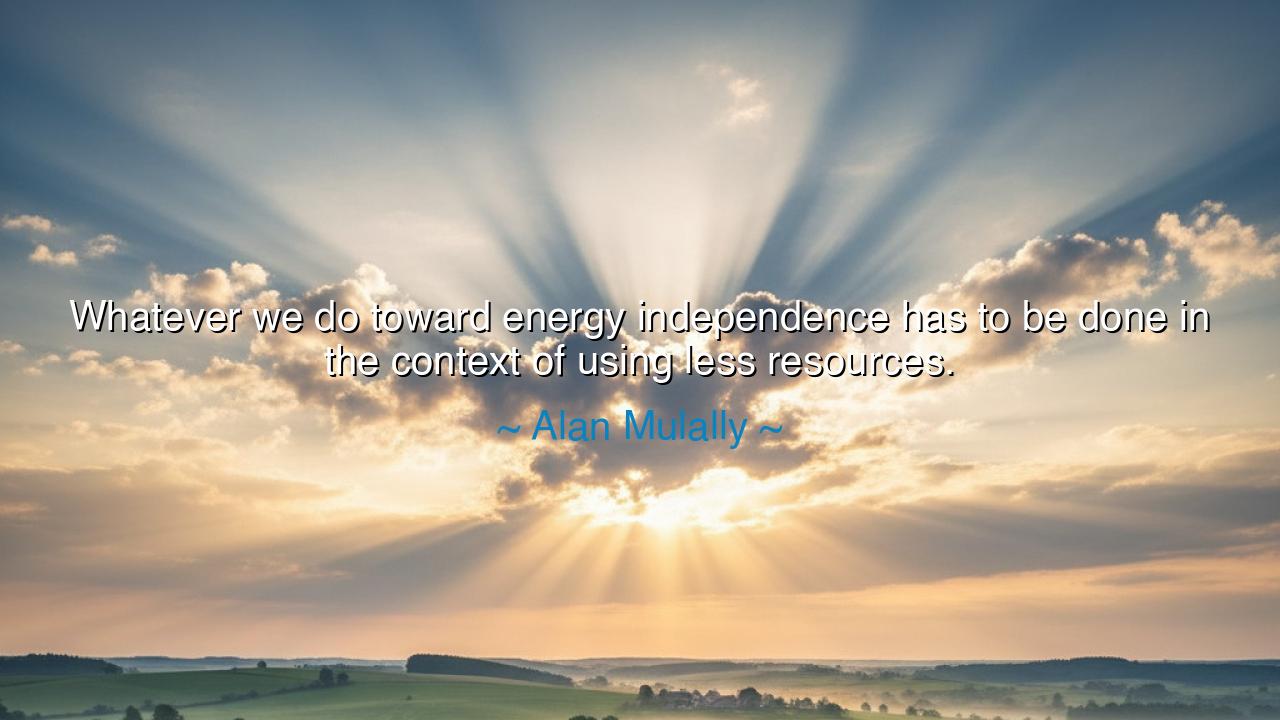
Whatever we do toward energy independence has to be done in the
Whatever we do toward energy independence has to be done in the context of using less resources.






Listen, O children of the future, to the words of Alan Mulally, a voice calling us to reflect deeply on our relationship with the Earth and the resources we consume. "Whatever we do toward energy independence has to be done in the context of using less resources." These words are not merely a suggestion; they are a call to wisdom, a reminder that progress and sustainability are not mutually exclusive, but must be intertwined if we are to preserve the world for future generations. In this simple statement, we are reminded that the true path to freedom is not a reckless pursuit of abundance, but a mindful and responsible stewardship of the resources that sustain us.
In the ancient world, the great civilizations understood that power and prosperity were tied to the balance of human activity with nature. The Romans, with all their grandeur and might, built vast roads and aqueducts to expand their empire, but even they were forced to reckon with the limits of their resources. The Romans exploited the natural world to fuel their ambitions, but in time, their overconsumption led to the depletion of vital resources, contributing to their eventual decline. The wisdom of their experience is a warning, one that we must heed today: that the unchecked use of resources will lead not to sustained prosperity, but to inevitable decay.
The rise of the industrial age in the 19th century saw a new wave of exploitation of resources, driven by the ever-growing demand for energy, from coal to oil. It was a time of great innovation and progress, but also of excess. The pursuit of energy independence, in this context, became a powerful symbol of a nation’s ability to control its destiny, to free itself from the dependence on foreign sources of energy. Yet, as Mulally wisely points out, this pursuit must be tempered with a recognition of the need to use less—to reduce our consumption, to make our energy systems more efficient, and to develop new technologies that can sustain us without depleting the Earth’s treasures.
Consider, O children, the example of China in the 21st century. As the world’s largest consumer of energy and resources, China has sought to achieve energy independence by investing heavily in renewable energy sources such as wind and solar. Yet, even as it leads the charge in the development of green technologies, China has also faced challenges in curbing its consumption of coal and other nonrenewable resources. The lesson here is clear: while energy independence is an essential goal, it must be pursued with an awareness of how much we use and how much we waste. True sustainability comes not from finding more resources, but from using what we have more wisely, more efficiently, and more responsibly.
The words of Mulally also point to a larger philosophical truth: the path to freedom—whether personal, national, or global—does not lie in endless growth or in the pursuit of more. It lies in understanding that there are limits to what can be taken from the Earth, and that our true independence comes not from exploiting resources until they are gone, but from finding a balance between progress and conservation. The ancient wisdom of moderation, so deeply ingrained in cultures from Confucianism to the teachings of Aristotle, tells us that true strength lies not in excess, but in balance.
So, O children, the lesson is this: the road to energy independence and sustainability requires not just the discovery of new resources, but a commitment to use fewer and fewer, to live wisely, and to conserve. Energy independence must be coupled with responsible consumption, for only then can we ensure a future where resources are not depleted, but cherished. As Mulally urges, we must think beyond the short-term gains of increased production and think toward a future where balance governs our relationship with the Earth.
In your own lives, O children, let this wisdom guide you. Let the pursuit of progress be tempered by a mindful commitment to conservation, to using fewer resources, to being aware of the footprints you leave behind. Whether in your personal consumption or in your participation in the larger world, let your choices reflect the understanding that true freedom is found not in having more, but in living with what is sufficient and using it well. By embracing the idea of using less, we do not diminish our potential, but amplify our capacity to thrive in harmony with the Earth.






AAdministratorAdministrator
Welcome, honored guests. Please leave a comment, we will respond soon